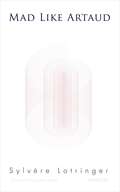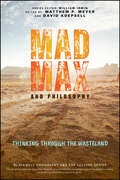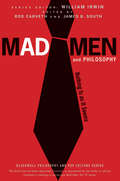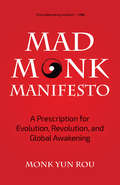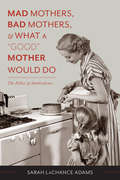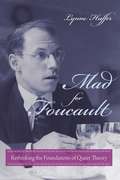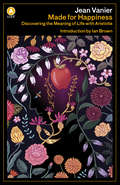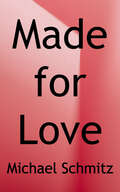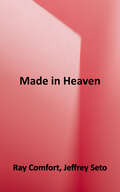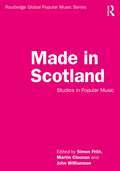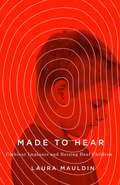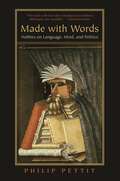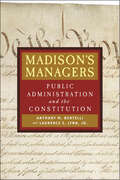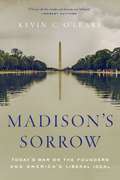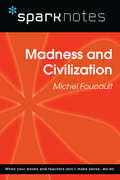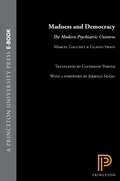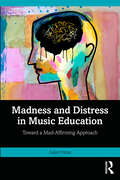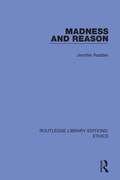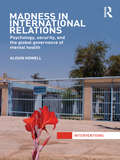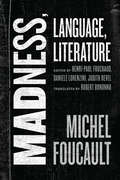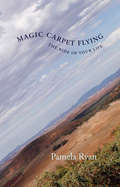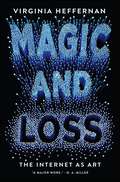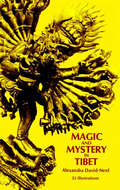- Table View
- List View
Mad Like Artaud (Univocal)
by Sylvère LotringerThose who are mad like Antonin Artaud, are they just as mad as he was? Madness, like the plague, is contagious, and everyone, from his psychiatrists to his disciples, family, and critics, everyone who gets close to Artaud, seems to participate in his delirium. Sylvère Lotringer explores various embodiments of this shared delirium through what Artaud called &“mental dramas&”—a series of confrontations with his witnesses or &“persecutors&” where we uncover the raw delirium at work, even in Lotringer himself. Mad Like Artaud does not intend to add one more layer of commentary to the bitter controversies that have been surrounding the cursed poet&’s work since his death in 1948, nor does it take sides among the different camps who are still haggling over his corpse. This book speaks of the site where &“madness&” itself is simmering.
Mad Max and Philosophy: Thinking Through the Wasteland (The Blackwell Philosophy and Pop Culture Series)
by William IrwinExplore the philosophy at the core of the apocalyptic future of Mad Max Beneath the stylized violence and thrilling car crashes, the Mad Max films consider universal questions about the nature of human life, order and anarchy, justice and moral responsibility, society and technology, and ultimately, human redemption. In Mad Max and Philosophy, a diverse team of political scientists, historians, and philosophers investigates the underlying themes of the blockbuster movie franchise, following Max as he attempts to rebuild himself and the world around him. Requiring no background in philosophy, this engaging and highly readable book guides you through the barren wastelands of a post-apocalyptic future as you explore ethics and politics in The Wasteland, the importance of costumes and music, humankind's relationship with nature, commerce, gender, religion, madness, and much more. Covers all of George Miller's Mad Max films, including Mad Max: Fury Road Discusses connections between Mad Max and Nietzsche, Malthus, Mill, Foucault, Sartre, and other major philosophers Follows Max's journey from policeman and family man to lost soul in search of redemption Examines the future of technology and possible impacts on society, the environment, and access to natural resources Delves into feminist themes of Mad Max, such as the reversal of heroic gender roles in Fury Road and relationships between power and procreationPart of the bestselling Blackwell Philosophy and Pop Culture series, Mad Max and Philosophy: Thinking Through the Wasteland is a must-read for anyone wanting to philosophically engage with Max, Furiosa, and their dystopian world.
Mad Men and Philosophy: Nothing Is as It Seems (The Blackwell Philosophy and Pop Culture Series #28)
by William IrwinA look at the philosophical underpinnings of the hit TV show, Mad Men With its swirling cigarette smoke, martini lunches, skinny ties, and tight pencil skirts, Mad Men is unquestionably one of the most stylish, sexy, and irresistible shows on television. But the series becomes even more absorbing once you dig deeper into its portrayal of the changing social and political mores of 1960s America and explore the philosophical complexities of its key characters and themes. From Socrates, Plato, and Aristotle to John Kenneth Galbraith, Milton Friedman, and Ayn Rand, Mad Men and Philosophy brings the thinking of some of history's most powerful minds to bear on the world of Don Draper and the Sterling Cooper ad agency. You'll gain insights into a host of compelling Mad Men questions and issues, including happiness, freedom, authenticity, feminism, Don Draper's identity, and more. Takes an unprecedented look at the philosophical issues and themes behind AMC's Emmy Award-winning show, Mad Men Explores issues ranging from identity to authenticity to feminism, and more Offers new insights on your favorite Mad Men characters, themes, and storylines Mad Men and Philosophy will give Mad Men fans everywhere something new to talk about around the water cooler.
Mad Monk Manifesto: A Prescription for Evolution, Revolution, and Global Awakening
by Yun RouWinner of Both Gold & Silver 2018 Nautilus Book Award and #1 New Release in Taoism and Tao Te ChingChange Yourself, Change The WorldFind answers. It’s easy to get outraged by world events, frustrated by our own personal battles, and disenfranchised from government and leadership. Born of moral indignation, informed by decades of study, and seasoned by a life of devoted self-cultivation, Monk Yun Rou’s Mad Monk Manifesto has answers, personal prescriptions, and calls to social and political action in one powerful book.Change the world by changing ourselves. Based on ancient Chinese wisdom such as Lao Tzu’s Tao Te Ching, Mad Monk Manifesto is part tour guide to consciousness, part recipe for personal development, part prescription for environmental salvation, and part handbook for social change.Wise advice for the awakened life. As ripples move away from a stone dropped into a pond, Mad Monk Manifesto begins with our personal lives, discussing diet, exercise, meditation, and mind/body practice. Then it expands to our public environment, describing what we can do to improve our community, government, and the world. Full of everything from advice for a healthy, conscious lifestyle to actions we can take to enhance the lives of friends, family, coworkers, and community members; Mad Monk Manifesto highlights spirituality and service. In addition, Monk Yun Rou encourages everyone to engage in the nature that surrounds them, showing how environmentalism can take place in daily life.Mad Monk Manifesto is precisely what the world needs at a time of unprecedented environmental disasters, international instability, and divisive and unreliable leadership. After reading this book, you will learn:How to relax, rectify, and rebalance lifeHow to bolster the community and deepen cultureHow to effect positive change in commerce, government, power, and the environmentMad Monk Manifesto is for readers of Alan Watts, Eckhart Tolle, and Change Your Thoughts—Change Your Life by Dr. Wayne W. Dyer.
Mad Mothers, Bad Mothers, and What a "Good" Mother Would Do
by Sarah Lachance AdamsWhen a mother kills her child, we call her a bad mother, but, as this book shows, even mothers who intend to do their children harm are not easily categorized as "mad" or "bad." Maternal love is a complex emotion rich with contradictory impulses and desires, and motherhood is a conflicted state in which women constantly renegotiate the needs mother and child, the self and the other. Applying care ethics philosophy and the work of Emmanuel Levinas, Maurice Merleau-Ponty, and Simone de Beauvoir to real-world experiences of motherhood, Sarah LaChance Adams throws the inherent tensions of motherhood into sharp relief, drawing a more nuanced portrait of the mother and child relationship than previously conceived. The maternal example is particularly instructive for ethical theory, highlighting the dynamics of human interdependence while also affirming separate interests. LaChance Adams particularly focuses on maternal ambivalence and its morally productive role in reinforcing the divergence between oneself and others, helping to recognize the particularities of situation, and negotiating the difference between one's own needs and the desires of others. She ultimately argues maternal filicide is a social problem requiring a collective solution that ethical philosophy and philosophies of care can inform.
Mad Mothers, Bad Mothers, and What a "Good" Mother Would Do: The Ethics of Ambivalence
by Sarah LaChance AdamsWhen a mother kills her child, we call her a bad mother, but, as this book shows, even mothers who intend to do their children harm are not easily categorized as "mad" or "bad." Maternal love is a complex emotion rich with contradictory impulses and desires, and motherhood is a conflicted state in which women constantly renegotiate the needs mother and child, the self and the other. Applying care ethics philosophy and the work of Emmanuel Levinas, Maurice Merleau-Ponty, and Simone de Beauvoir to real-world experiences of motherhood, Sarah LaChance Adams throws the inherent tensions of motherhood into sharp relief, drawing a more nuanced portrait of the mother and child relationship than previously conceived. The maternal example is particularly instructive for ethical theory, highlighting the dynamics of human interdependence while also affirming separate interests. LaChance Adams particularly focuses on maternal ambivalence and its morally productive role in reinforcing the divergence between oneself and others, helping to recognize the particularities of situation, and negotiating the difference between one's own needs and the desires of others. She ultimately argues maternal filicide is a social problem requiring a collective solution that ethical philosophy and philosophies of care can inform.
Mad for Foucault: Rethinking the Foundations of Queer Theory (Gender and Culture Series)
by Lynne HufferMichel Foucault was the first to embed the roots of human sexuality in discipline and biopolitics, therefore revolutionizing our conception of sex and its relationship to society, economics, and culture. Yet over the past two decades, scholars have limited themselves to the study of Foucault's History of Sexuality, volume 1 paying lesser attention to his equally explosive History of Madness. In this earlier volume, Foucault recasts Western rationalism as a project that both produces and represses sexual deviants, calling out the complicity of modern science and the exclusionary nature of family morality. By reclaiming these deft moves, Lynne Huffer teases out exciting new strands of Foucauldian thought. She then revisits the theorist's ethical work in light of these discoveries, divining an ethics of eros that sees sexuality as a lived experience we are repeatedly called on to remember. Throughout her study, Huffer weaves her own experiences together with Foucault's, sampling from unpublished interviews and other archived materials in order to intimately rework the problem of sexuality as a product of reason.
Made for Happiness: Discovering the Meaning of Life with Aristotle
by Jean VanierThis bestselling work is an uplifting and practical look at philosophy and how it can be applied in our everyday lives from the author of the international bestseller, Becoming Human.In Made for Happiness, Jean Vanier examines the basis for modern moral philosophy and its role in our lives today. Having discovered through his work with the intellectually disabled the degree to which our society is divided, and our values misplaced, Vanier invites us to read with fresh eyes theories of happiness written 2,400 years ago.The book follows the links between psychology, spirituality, and morality: psychology helps us face our fears and limitations; spirituality gives us strength; and morality helps us to choose the best actions, those that will make us happier, and thus more human. The combination of these paths to knowledge and wisdom gives meaning to our lives and allows us to make the best use of our freedom on our way to happiness.
Made for Love: Same-Sex Attraction and the Catholic Church
by Michael SchmitzIn Made for Love, Fr. Michael Schmitz presents the Catholic teaching on same-sex attraction and same-sex "sexual" relations. <p><p>He begins by giving background information regarding the different worldviews of the human person, the philosophical ideas of nature and purpose, the differences between objective and subjective truth, the principal of non-contradiction, and the fallen human nature that resulted from Original Sin. He then discusses in great detail the nature and ends of human sexuality and the nature of true love, while, in a compassionate and non-judgmental way, explaining the flawed nature of same-sex "sexual" relations. <p><p>While this book is intended primarily for those who have same-sex attraction and their family and friends, its presentation of the compassionate truth of Catholic teaching on same-sex attraction will be of great benefit to everyone in today's society.
Made in Heaven: Man's Indiscriminate Stealing of God's Amazing Design
by Ray Comfort Jeffrey SetoEngineers have long examined God's creation to understand and mimic complex, proven mechanics of design. They have plumbed the depths of the natural world, encompassing insects and plants to man in search of wisdom and insight. The simplicity yet intricacy of how God designs work and how He manufacturers complexity in nature astounds and inspires engineers in hypothesis and designs that could not be formed otherwise.
Made in Scotland: Studies in Popular Music (Routledge Global Popular Music Series)
by John Williamson Simon Frith Martin CloonanMade in Scotland: Studies in Popular Music serves as a comprehensive and thorough introduction to the history, politics, culture, and musicology of twentieth- and twenty-first-century popular music in Scotland. The volume consists of essays by local experts and leading scholars in Scottish music and culture, and covers the major figures, styles, and social contexts of popular music in Scotland. Each essay provides adequate context so readers understand why the figure or genre under discussion is of lasting significance. The book includes a general introduction to Scottish popular music, followed by essays organized into three thematic sections: Histories, Politics and Policies, and Futures and Imaginings. Examining music as cultural expression in a country that is both a nation and a region within a larger state, this volume uses popular music to analyse Scottishness, independence, and diversity and offers new insights into the complexity of cultural identity, the power of historical imagination, and the effects of power structures in music. It is a vital read for scholars and students interested in how popular music interacts with and shapes such issues both within and beyond the borders of Scotland.
Made to Hear: Cochlear Implants and Raising Deaf Children (A Quadrant Book)
by Laura MauldinA mother whose child has had a cochlear implant tells Laura Mauldin why enrollment in the sign language program at her daughter&’s school is plummeting: &“The majority of parents want their kids to talk.&” Some parents, however, feel very differently, because &“curing&” deafness with cochlear implants is uncertain, difficult, and freighted with judgment about what is normal, acceptable, and right. Made to Hear sensitively and thoroughly considers the structure and culture of the systems we have built to make deaf children hear.Based on accounts of and interviews with families who adopt the cochlear implant for their deaf children, this book describes the experiences of mothers as they navigate the health care system, their interactions with the professionals who work with them, and the influence of neuroscience on the process. Though Mauldin explains the politics surrounding the issue, her focus is not on the controversy of whether to have a cochlear implant but on the long-term, multiyear undertaking of implantation. Her study provides a nuanced view of a social context in which science, technology, and medicine are trusted to vanquish disability—and in which mothers are expected to use these tools. Made to Hear reveals that implantation has the central goal of controlling the development of the deaf child&’s brain by boosting synapses for spoken language and inhibiting those for sign language, placing the politics of neuroscience front and center.Examining the consequences of cochlear implant technology for professionals and parents of deaf children, Made to Hear shows how certain neuroscientific claims about neuroplasticity, deafness, and language are deployed to encourage compliance with medical technology.
Made with Words: Hobbes on Language, Mind, and Politics
by Philip PettitHobbes's extreme political views have commanded so much attention that they have eclipsed his work on language and mind, and on reasoning, personhood, and group formation. But this work is of immense interest in itself, as Philip Pettit shows in Made with Words, and it critically shapes Hobbes's political philosophy. Pettit argues that it was Hobbes, not later thinkers like Rousseau, who invented the invention of language thesis--the idea that language is a cultural innovation that transformed the human mind. The invention, in Hobbes's story, is a double-edged sword. It enables human beings to reason, commit themselves as persons, and incorporate in groups. But it also allows them to agonize about the future and about their standing relative to one another; it takes them out of the Eden of animal silence and into a life of inescapable conflict--the state of nature. Still, if language leads into this wasteland, according to Hobbes, it can also lead out. It can enable people to establish a commonwealth where the words of law and morality have a common, enforceable sense, and where people can invoke the sanctions of an absolute sovereign to give their words to one another in credible commitment and contract. Written by one of today's leading philosophers, Made with Words is both an original reinterpretation and a clear and lively introduction to Hobbes's thought.
Madison's Managers: Public Administration and the Constitution (Johns Hopkins Studies in Governance and Public Management)
by Anthony M. Bertelli E. Jr. LynnA case for the constitutional roots of public administration: “Essential to the field as we develop new theories and applications in a postmodern America.” ?Political Studies ReviewCombining insights from traditional thought and practice and from contemporary political analysis, Madison’s Managers presents a constitutional theory of public administration in the United States. Anthony Michael Bertelli and Laurence E. Lynn Jr. contend that managerial responsibility in American government depends on official respect for the separation of powers and a commitment to judgment, balance, rationality, and accountability in managerial practice.The authors argue that public management—administration by unelected officials of public agencies and activities based on authority delegated to them by policymakers—derives from the principles of American constitutionalism, articulated most clearly by James Madison. Public management is, they argue, a constitutional institution necessary to successful governance under the separation of powers. To support their argument, Bertelli and Lynn combine two intellectual traditions often regarded as antagonistic: modern political economy, which regards public administration as controlled through bargaining among the separate powers and organized interests, and traditional public administration, which emphasizes the responsible implementation of policies established by legislatures and elected executives while respecting the procedural and substantive rights enforced by the courts. These literatures are mutually reinforcing, the authors argue, because both feature the role of constitutional principles in public management.Madison’s Managers challenges public management scholars and professionals to recognize that the legitimacy and future of public administration depend on its constitutional foundations and their specific implications for managerial practice.
Madison's Sorrow: Today's War on the Founders and America's Liberal Ideal
by Kevin O'LearyAn eye-opening cultural history of the political revolution that has destroyed the Republican Party and unleashed an illiberal crusade against the ideals of the Founding Fathers.The story of America is the struggle between our liberal ideal and illiberal resistance. Donald Trump catalyzed a reactionary revolution by tapping into the dark, shadowy side of American democracy that embraces exclusion and inequality. Throughout American history these alarming impulses have come to the forefront of our culture—during the Civil War, the era of the Robber Barons, and the Civil Rights Movement—but have now come to fruition in the presidency of Donald Trump. Arguing that the contemporary Republican Party is waging a counterrevolution against the core beliefs of the nation, journalist and scholar Kevin C. O&’Leary cracks open American history to reveal the essence of America&’s liberal heritage by critiquing the reactionary illiberal currents that periodically threaten American democracy. American politics is no longer an ongoing debate between liberals and conservatives because the new Republican Party embraces the feudal values of the Old World. While there are millions of conservatives in the population, the elected leadership of the GOP is deeply reactionary. Today&’s marriage of white-identity Southerners and their northern allies to moneyed libertarians is no run-of-the-mill political partnership. Instead, it is extraordinarily dangerous. Clearly, conservatives have lost their party. And without conservatives debating liberals in an intellectual, respectful manner to address the nation&’s problems, Madisonian democracy breaks down. A stimulating reinterpretation of the American experience, Madison&’s Sorrow exposes the intellectual and moral deficiencies of the illiberal right while offering a robust defense of the liberal tradition.
Madness and Civilization (SparkNotes Philosophy Guide)
by SparkNotesMadness and Civilization (SparkNotes Philosophy Guide) Making the reading experience fun! SparkNotes Philosophy Guides are one-stop guides to the great works of philosophy–masterpieces that stand at the foundations of Western thought. Inside each Philosophy Guide you&’ll find insightful overviews of great philosophical works of the Western world.
Madness and Democracy: The Modern Psychiatric Universe (New French Thought Series)
by Marcel Gauchet Gladys SwainHow the insane asylum became a laboratory of democracy is revealed in this provocative look at the treatment of the mentally ill in nineteenth-century France. Political thinkers reasoned that if government was to rest in the hands of individuals, then measures should be taken to understand the deepest reaches of the self, including the state of madness. Marcel Gauchet and Gladys Swain maintain that the asylum originally embodied the revolutionary hope of curing all the insane by saving the glimmer of sanity left in them. Their analysis of why this utopian vision failed ultimately constitutes both a powerful argument for liberalism and a direct challenge to Michel Foucault's indictment of liberal institutions.The creation of an artificial environment was meant to encourage the mentally ill to live as social beings, in conditions that resembled as much as possible those prevailing in real life. The asylum was therefore the first instance of a modern utopian community in which a scientifically designed environment was supposed to achieve complete control over the minds of a whole category of human beings. Gauchet and Swain argue that the social domination of the inner self, far from being the hidden truth of emancipation, represented the failure of its overly optimistic beginnings.Madness and Democracy combines rich details of nineteenth-century asylum life with reflections on the crucial role of subjectivity and difference within modernism. Its final achievement is to show that the lessons learned from the failure of the asylum led to the rise of psychoanalysis, an endeavor focused on individual care and on the cooperation between psychiatrist and patient. By linking the rise of liberalism to a chapter in the history of psychiatry, Gauchet and Swain offer a fascinating reassessment of political modernity.
Madness and Distress in Music Education: Toward a Mad-Affirming Approach
by Juliet HessMadness and Distress in Music Education offers an in-depth exploration of mental health and emotional distress in the context of music education, offering new ways of thinking about these experiences and constructing ways to support distress through affirming pedagogy, practices, and policies in music education. Centering the lived experiences of 15 people in a range of roles across music education who self-identify an issue with their mental health, the volume addresses impacts on both students and educators. The author draws on Mad Studies and disability studies to present new paradigms for thinking about Madness and distress in the music context. An essential resource for music educators, music education researchers, and preservice students seeking to understand the complexities of mental health in the music classroom, this book considers how people conceptualize their mental health, how distress impacts participation in music education, how music education may support or exacerbate distress, and what supports for distress can be implemented in music education.
Madness and Reason
by Jennifer RaddenOriginally published in 1985, this book provides a philosophical analysis of the concepts of madness and moral responsibility. It challenges the view that because they are victims of mental illness, the insane should not be blamed for actions resulting from their condition. The author urges a return to the neglected equation between madness and a want of reason, arguing that the impulse to excuse the criminally insane must be grounded in an appeal to their irrationality and unreasonableness. Through meticulous examination of the psychological states and behaviour patterns of major mental abnormalities, such as schizophrenia and depression, the author develops a notion of exculpating unreason. This is an interdisciplinary book which encompasses analytical philosophy, abnormal psychology and law.
Madness in International Relations: Psychology, Security, and the Global Governance of Mental Health (Interventions)
by Alison HowellMadness in International Relations provides an important and innovative account of the role of psychology and psychiatry in global politics, showing how mental health governance has become a means of securing various populations, often with questionable effects. Through the analysis of three key case studies Howell illustrates how such therapeutic interventions can at times be coercive and sovereign, at other times disciplinary, and at still other times benevolent, though not benign. In each case a ‘diagnostic competition’ is traced, that is, a contestation over how best to diagnose and treat the population in question. The book examines the populations of Guantánamo Bay, post-conflict societies and western militaries, identifying how these diagnostic competitions ultimately rest on shared assumptions about the value of psychology and psychiatry in managing global security, about the value of achieving security through mental health governance, and ultimately about the medicalization of security. This work will be of great interest to all scholars of International relations, critical theory and security studies.
Madness, Language, Literature (The Chicago Foucault Project)
by Michel FoucaultNewly published lectures by Foucault on madness, literature, and structuralism. Perceiving an enigmatic relationship between madness, language, and literature, French philosopher Michel Foucault developed ideas during the 1960s that are less explicit in his later, more well-known writings. Collected here, these previously unpublished texts reveal a Foucault who undertakes an analysis of language and experience detached from their historical constraints. Three issues predominate: the experience of madness across societies; madness and language in Artaud, Roussel, and Baroque theater; and structuralist literary criticism. Not only do these texts pursue concepts unique to this period such as the “extra-linguistic,” but they also reveal a far more complex relationship between structuralism and Foucault than has typically been acknowledged.
Magic Carpet Flying: The Ride of Your Life
by Pamela RyanMagic Carpet Flying traces psychologist Pamela Ryan’s journey through her life’s adventures, from the rapture of achievement to the personal anguish of loss. Drawing on childhood lessons in rural Australia and later work in the Australian outback, Africa, Asia, and other parts of the world where she travelled to help others tackle the darkness of mental illness, suicide, and large-scale tragedy arising from terrorist attacks and natural disasters, Ryan reveals how she not only survived trauma but turned her journey into a "magic carpet ride." Exploring what it is to "live truth," to "make ourselves up as we go along," to aim for the stars, and to become the "pilot in command" of our own destiny, Pamela Ryan’s unforgettable journey in Magic Carpet Flying reveals what it means to be fully alive.
Magic and Loss: The Internet as Art
by Virginia HeffernanJust as Susan Sontag did for photography and Marshall McLuhan did for television, Virginia Heffernan (called one of the "best living writers of English prose") reveals the logic and aesthetics behind the Internet.Since its inception, the Internet has morphed from merely an extension of traditional media into its own full-fledged civilization. It is among mankind's great masterpieces--a massive work of art. As an idea, it rivals monotheism. We all inhabit this fascinating place. But its deep logic, its cultural potential, and its societal impact often elude us. In this deep and thoughtful book, Virginia Heffernan presents an original and far-reaching analysis of what the Internet is and does. Life online, in the highly visual, social, portable, and global incarnation rewards certain virtues. The new medium favors speed, accuracy, wit, prolificacy, and versatility, and its form and functions are changing how we perceive, experience, and understand the world.
Magic and Loss: The Internet as Art
by Virginia HeffernanJust as Susan Sontag did for photography and Marshall McLuhan did for television, Virginia Heffernan (called one of the "best living writers of English prose") reveals the logic and aesthetics behind the Internet.Since its inception, the Internet has morphed from merely an extension of traditional media into its own full-fledged civilization. It is among mankind's great masterpieces--a massive work of art. As an idea, it rivals monotheism. We all inhabit this fascinating place. But its deep logic, its cultural potential, and its societal impact often elude us. In this deep and thoughtful book, Virginia Heffernan presents an original and far-reaching analysis of what the Internet is and does. Life online, in the highly visual, social, portable, and global incarnation rewards certain virtues. The new medium favors speed, accuracy, wit, prolificacy, and versatility, and its form and functions are changing how we perceive, experience, and understand the world.
Magic and Mystery in Tibet
by Madame Alexandra David-NeelFor centuries Tibet has been known as the last home of mystery, the hidden, sealed land, where ancient mysteries still survive that have perished in the rest of the Orient. Many men have written about Tibet and its secret lore, but few have actually penetrated it to learn its ancient wisdom. Among those few was Madame Alexandra David-Neel, a French orientalist. A practicing Buddhist, a profound historian of religion, and linguist, she actually lived in Tibet for more than 14 years. She had the great honor of being received by the Dalai Lama; she studied philosophical Buddhism and Tibetan Tantra at the great centers; she meditated in lonely caves and on wind-swept winter mountains with yogi hermits; and she even witnessed forbidden corpse-magic in the forests. Her experiences have been unique.Magic and Mystery in Tibet tells the story of her experiences in Tibet, among lamas and magicians. It is neither a travel book nor an autobiography but a study of psychic discovery, a description of the occult and mystical theories and psychic training practices of Tibet. She tells of great sages and sorcerers that she met; of the system of monastic education; the great teachers and their disciples; Tibetan folklore about their spiritual athletes; reincarnation and memory from previous lives; elaborate magical rites to obtain siddhis; the horrible necromantic magic of the pre-Buddhist Bonpa shamas; mental visualization exercises to create disembodied thought forms (tulpas); visions; phenomena of physical yoga, control of the body heat mechanism; breathing exercises; sending “messages on the wind”; and much similar material.An unusual aspect of Madame David-Neel’s book is that she herself experienced many of the phenomena she describes, yet she describes them with precision and in a matter-of-fact manner, permitting the reader to draw his own conclusions about validity, interpretation in terms of psychology, and value. Particularly interesting for the modern experiencer are her detailed instructions for tumo (the yoga of heat control) and creation of thought projections.
